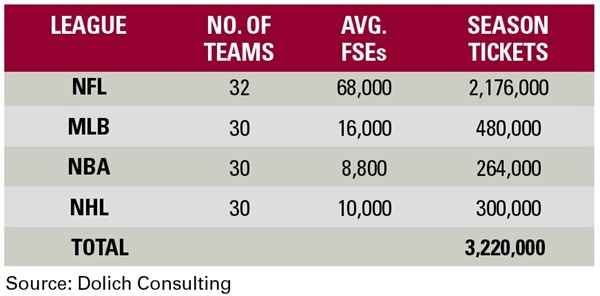Professional sports leagues and many collegiate athletic departments are running out of new revenue sources. Premium seating, suites and season tickets are increasingly more difficult to sell and renew. No-show rates at games are increasing. Teams are struggling to monetize the growth in social networking and many forms of new media. Stadium and arena naming rights are unsponsored in some markets. Team owners are asking their business operations executives where the new revenue will be coming from. There are no easy answers.
But one could be appearing virtually before our eyes.
The next significant new revenue source for pro sports could be virtual season tickets. Teams have the ability to package significant pieces of inventory and benefits into virtual yet tangible off-site season tickets on a platform constructed to generate untapped revenue without cannibalizing existing team profit centers.
Consider this: There are tens of millions of fans devoted to 122 North American professional teams who will never set foot in their favorite team’s home venue. According to Navigate Research, the market of fans who are very interested or somewhat interested in the big four U.S. team sports are as follows: 83 million NFL fans, 59 million for MLB, 41 million for the NBA and 21 million for the NHL. That’s more than 200 million fans interested in following their favorite teams, yet only 3.2 million have season tickets.
The reasons that keep fans from attending home games of their favorite teams are varied and range from geography to affordability to the availability of other entertainment options.
The answer?
A virtual season ticket could be built on everything that happens in and around the game. The virtual season-ticket holder would experience the live environment of the venue through a virtual platform. Advances in technology, interactivity, 3-D TV, video games, social gaming, mobile applications, video streaming and virtual spectatorship could bring virtual season-ticket holders into the stadium environment without actually being there or spending thousands of dollars on tickets.
Think of the current market of season-ticket holder benefits as hundreds of pick-up sticks. The virtual season ticket could bring order to this chaos. Fans could buy from a matrix of inventory as part of virtual season-ticket packages that could open a significant new revenue stream.
How will it work?
Let me describe what a Green Bay Packers game day could be like for virtual season-ticket holders.
■
On the computer, tablet or smartphone, weekly customized matchups for that day’s game and a customized, downloadable sports stat package would be available.
■
Virtual access to premium tailgate parties would be available and the opportunity to interact with top grillers.
■
A member of the Packers would offer a real-time customized virtual tour through the team’s offices and training facility, followed by a virtual walk over to the Packers Hall of Fame where a hall of famer acts as tour guide.
■
At halftime, they could take a virtual walk around Lambeau Field and virtually tour the locker room.
■
When the team is on the road, fans would have virtual access to a bus and plane cam so they could feel like they are with the traveling party.
■
Inside the virtual VIP suite, they could discuss the game action with Packers alumni players.
■
Fantasy play-by-play: Virtual season-ticket holders and a friend could broadcast the game in a virtual broadcast booth.
■
Using Cisco’s TelePrescence live video conferencing technology, virtual season-ticket holders could chat with Packers players, coaches and team executives before every game and at other times during the season.
■
Packerville: Similar to the Farmville concept created by Zynga, fans could build their own stadiums, compete and purchase virtual goods as they build their teams.
Market size
The four major professional sports attracted a combined audience of 140 million fans to their venues in 2011. That number includes season-ticket holders, partial season-ticket holders, groups, single-game purchasers and suite holders.
Teams keep their real number of full-season-ticket equivalents under lock and key. The total number of account holders is less than the gross number of season tickets. There is a duplication factor inherent in fans attending multiple times and being season-ticket holders of multiple teams in a market. An estimate of the number of season-ticket holders for each of the four major sports are listed above:
There is a multibillion-dollar market of spending from pro sports team fans that isn’t being effectively marketed. By creating a unique proprietary service/product offering through one-stop shopping, teams and leagues would create a new revenue pool that could break the stagnating revenue trend in pro sports.
The future
Virtual season-ticket packages will be scalable so that significant new revenue can flow to the rights holders.
Teams, leagues, schools and event promoters will have to invest creatively, technically and financially in implementing their customized programs. Since they own the rights, the costs should be minimal and the payoffs profitable.
I have sat on the other side of the table from vendors and entrepreneurs pitching various unconnected components of this virtual puzzle. No single entity is effectively addressing the matrix concept of the virtual season ticket. Companies are trying to get teams to buy their product with promises of additional revenue or greater insight into existing fan behavior. The market activation has many spokes but no hub.
The day of the little piece of cardboard known as a ticket is slowly disappearing. As we peer around the corner the virtual season ticket could become just the ticket.
Andy Dolich (andy.dolich@gmail.com) is managing director of U.S. sports practice for Odgers Berndtson and has held team executive posts in the NFL, NBA, MLB and NASL.





